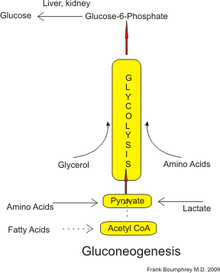I'm not sure that fat is a major player in gluconeogenesis; I think it mainly features protein.
I know it's wiki, but:-
https://en.wikipedia.org/wiki/Gluconeogenesis
So can be fat or protein.
Takes a lot of energy, though.
That can be a good thing, if the objective is fat loss

The most I can find about the role of insulin in gluconeogenesis is that it works with glucagon to control gluconeogenesis. Insulin and glucagon are the two hormones which are supposed to balance our blood glucose levels by stimulating or preventing the production of glucose from the liver. My guess is that glucose is released from the store in the liver, and if the body calls for more then gluconeogenesis is fired up in the liver to produce more.
Yup, the way I look at it is they're opposing processes, so insulin when glucose levels are high, glucagon when low with the liver/pancreas trying to keep an optimal level.. Which in our case isn't working properly. When it is, we're an awesome chemical refinery that can convert different resources into things the body needs, or save them for later.
So immediate stuff is circulating glucose, then if there's excess, conversion and storage to short-term glycogen in liver & muscles, and long-term in lipocytes.. Which is the bit insulin encourages, and we resist. Then if we need energy, glycogenolysis converts the glycogen in muscles & liver to glucose. And if we need more, then glucagon stimulates gluconeogenesis
I think "reduce carbohydrate intake to stimulate gluconeogenesis so the body uses up it's own fat reserves" is not really correct. My understanding is that when we go very low carbohydrate the body turns to burning fat directly for energy (so we lose weight) and have a very low need for glucose - some brain functions and blood cells mainly. Protein mainly is used to via gluconeogenesis to maintain the level of glucose in the blood, along with the few carbohydrates in the diet.
It's how the body burns fat directly, and something we want to do in preference, after all lipocytes are our long-term energy stores. There's debate around what/how lipocytes are triggered to release lipids, and personally I'm not convinced it's adrenaline because that process would seem a bit slow in a 'fight or flight' situation. Makes more sense to me to be part of the insulin/glucagon routine.
One message from all this is if you are very low carbohydrate and running on fat, then any protein not needed directly for maintenance of muscles will be fed through gluconeogenesis and turned into glucose. This in turn means that if you eat a lot of protein you will produce a lot of glucose, which will be stored as fat.
And it all gets very complicated, ie keto's a whole different set of pathways. Plus there's the difference between how we digest what we eat, and what our bodies then do with it.
This is why LCHF should be 80% fat, 15% protein and 5% carbohydrates. This is also probably one reason why I am not losing weight at the moment.
Have you tried adjusting it so you have more protein and less fat? I've been doing that mainly to slow muscle loss. Seems to be working for me, and as it's the Friday weigh in tomorrow, can add some graphs showing how that's been going if you're interested.
One reason why weight plateaus could be the reduction of Insulin Resistance as you lose weight. Once you are down to your fighting weight and have reduced IR to normal or near normal levels then any little indulgence, such as a few carbohydrates or a bit too much protein, will be easily stored as fat. Your body is running very efficiently and needs very little glucose because it is burning fat so any small excess gets tucked away back in the fat cells.
Yup. Insulin resistance is something I don't really understand.. But from past training experiences, it's certainly the two phased approach, ie what we need to do to lose weight, then to maintain it. And I'm kinda hoping insulin resistance sorts itself out along the way


